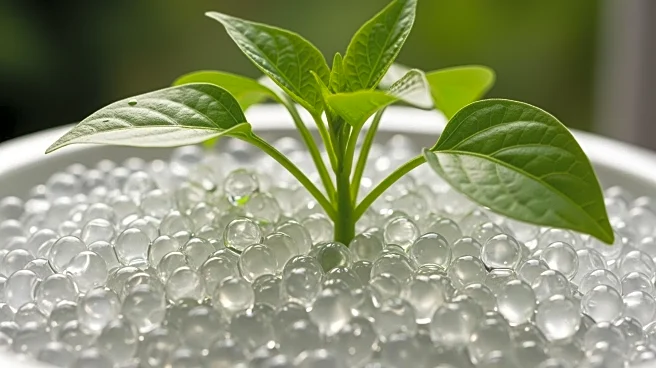What's Happening?
Scientists at the Italian Institute of Technology and the Free University of Bozen-Bolzano have developed a water-absorbing gel made from ocean plants, specifically red seaweed, which can significantly
enhance agricultural practices. This gel absorbs moisture at 70 times its own mass and slowly releases water, allowing crops to thrive with minimal irrigation. The innovation aims to address challenges such as water scarcity and soil depletion, which are prevalent in modern agriculture. During lab trials, seeds treated with this gel germinated faster and produced stronger plants compared to traditional water-based systems. The gel is particularly effective in hydroponic setups where soil is not used, and it decomposes naturally, avoiding the environmental damage associated with synthetic foams.
Why It's Important?
This development is crucial for agriculture, especially in regions facing water shortages and arid conditions. By reducing the need for irrigation, the gel conserves water resources, which can be redirected to urban areas and households. Additionally, the gel's ability to decompose naturally addresses the issue of agricultural plastic waste, offering a sustainable alternative to synthetic materials that contribute to landfill pollution. The innovation could lead to more resilient and environmentally friendly farming practices, potentially transforming how food is grown in water-limited areas and reducing the environmental footprint of agriculture.
What's Next?
The research team plans to integrate sensors into the gel that can naturally decompose, providing real-time data on crop health and environmental conditions. This advancement could further optimize agricultural practices by allowing farmers to monitor and adjust growing conditions more precisely. The widespread adoption of this technology could lead to significant changes in farming methods, promoting sustainability and efficiency in food production.
Beyond the Headlines
Beyond immediate agricultural benefits, this gel could influence broader environmental and economic policies by encouraging sustainable practices and reducing dependency on water-intensive farming. It may also inspire further research into biodegradable materials and their applications in various industries, potentially leading to innovations that address other environmental challenges.











